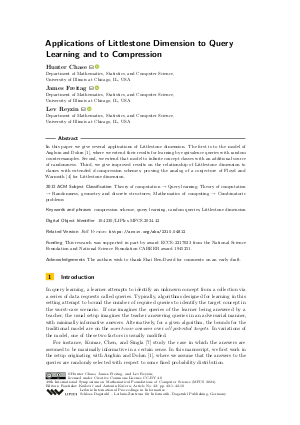Applications of Littlestone Dimension to Query Learning and to Compression
Authors
Hunter Chase  ,
James Freitag
,
James Freitag  ,
Lev Reyzin
,
Lev Reyzin 
-
Part of:
Volume:
49th International Symposium on Mathematical Foundations of Computer Science (MFCS 2024)
Part of: Series: Leibniz International Proceedings in Informatics (LIPIcs)
Part of: Conference: Mathematical Foundations of Computer Science (MFCS) - License:
 Creative Commons Attribution 4.0 International license
Creative Commons Attribution 4.0 International license
- Publication Date: 2024-08-23
File

PDF
LIPIcs.MFCS.2024.42.pdf
- Filesize: 0.64 MB
- 10 pages
Document Identifiers
Related Versions
- Full Version https://arxiv.org/abs/2310.04812
Subject Classification
ACM Subject Classification
- Theory of computation → Query learning
- Theory of computation → Randomness, geometry and discrete structures
- Mathematics of computing → Combinatoric problems
Keywords
- compression scheme
- query learning
- random queries
- Littlestone dimension
Metrics
- Access Statistics
-
Total Accesses (updated on a weekly basis)
0PDF Downloads0Metadata Views
Abstract
In this paper we give several applications of Littlestone dimension. The first is to the model of [Angluin and Dohrn, 2017], where we extend their results for learning by equivalence queries with random counterexamples. Second, we extend that model to infinite concept classes with an additional source of randomness. Third, we give improved results on the relationship of Littlestone dimension to classes with extended d-compression schemes, proving the analog of a conjecture of [Floyd and Warmuth, 1995] for Littlestone dimension.
Cite As Get BibTex
Hunter Chase, James Freitag, and Lev Reyzin. Applications of Littlestone Dimension to Query Learning and to Compression. In 49th International Symposium on Mathematical Foundations of Computer Science (MFCS 2024). Leibniz International Proceedings in Informatics (LIPIcs), Volume 306, pp. 42:1-42:10, Schloss Dagstuhl – Leibniz-Zentrum für Informatik (2024)
https://doi.org/10.4230/LIPIcs.MFCS.2024.42
BibTex
@InProceedings{chase_et_al:LIPIcs.MFCS.2024.42,
author = {Chase, Hunter and Freitag, James and Reyzin, Lev},
title = {{Applications of Littlestone Dimension to Query Learning and to Compression}},
booktitle = {49th International Symposium on Mathematical Foundations of Computer Science (MFCS 2024)},
pages = {42:1--42:10},
series = {Leibniz International Proceedings in Informatics (LIPIcs)},
ISBN = {978-3-95977-335-5},
ISSN = {1868-8969},
year = {2024},
volume = {306},
editor = {Kr\'{a}lovi\v{c}, Rastislav and Ku\v{c}era, Anton{\'\i}n},
publisher = {Schloss Dagstuhl -- Leibniz-Zentrum f{\"u}r Informatik},
address = {Dagstuhl, Germany},
URL = {https://drops.dagstuhl.de/entities/document/10.4230/LIPIcs.MFCS.2024.42},
URN = {urn:nbn:de:0030-drops-205988},
doi = {10.4230/LIPIcs.MFCS.2024.42},
annote = {Keywords: compression scheme, query learning, random queries, Littlestone dimension}
}
Author Details
- Department of Mathematics, Statistics, and Computer Science, University of Illinois at Chicago, IL, USA
- Department of Mathematics, Statistics, and Computer Science, University of Illinois at Chicago, IL, USA
Funding
This research was supported in part by award ECCS-2217023 from the National Science Foundation and National Science Foundation CAREER award 1945251.
Acknowledgements
The authors wish to thank Shai Ben-David for comments on an early draft.
References
-
Dana Angluin and Tyler Dohrn. The power of random counterexamples. In International Conference on Algorithmic Learning Theory, pages 452-465, 2017.

-
Shai Ben-David and Ami Litman. Combinatorial variability of Vapnik-Chervonenkis classes with applications to sample compression schemes. Discrete Applied Mathematics, 86(1):3-25, 1998.

-
Hunter Chase and James Freitag. Model theory and machine learning. Bulletin of Symbolic Logic, 25(3):319-332, 2019.

-
Sally Floyd and Manfred Warmuth. Sample compression, learnability, and the Vapnik-Chervonenkis dimension. Machine learning, 21(3):269-304, 1995.

- Vincent Guingona. NIP theories and computational learning theory. URL: https://tigerweb.towson.edu/vguingona/NIPTCLT.pdf.
-
Hunter R Johnson and Michael C Laskowski. Compression schemes, stable definable families, and o-minimal structures. Discrete & Computational Geometry, 43(4):914-926, 2010.

-
Akash Kumar, Yuxin Chen, and Adish Singla. Teaching via best-case counterexamples in the learning-with-equivalence-queries paradigm. Advances in Neural Information Processing Systems, 34:26897-26910, 2021.

-
Dima Kuzmin and Manfred K Warmuth. Unlabeled compression schemes for maximum classes. Journal of Machine Learning Research, 8(9), 2007.

-
Nick Littlestone. Learning quickly when irrelevant attributes abound: A new linear-threshold algorithm. Machine Learning, 2(4):285-318, 1988.

-
Nick Littlestone and Manfred Warmuth. Relating data compression and learnability. Technical report, University of California, Santa Cruz, 1986.

-
Shay Moran and Amir Yehudayoff. Sample compression schemes for VC classes. Journal of the ACM (JACM), 63(3):21, 2016.

-
Manfred K. Warmuth. Compressing to vc dimension many points. In Bernhard Schölkopf and Manfred K. Warmuth, editors, Learning Theory and Kernel Machines, pages 743-744, Berlin, Heidelberg, 2003. Springer Berlin Heidelberg.

